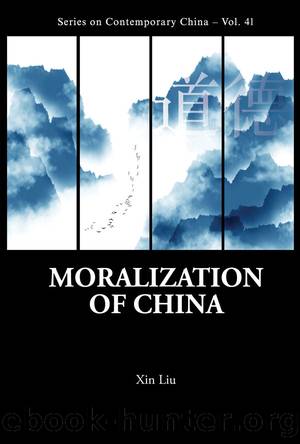Moralization of China by Xin Liu

Author:Xin Liu [Liu, Xin]
Language: eng
Format: epub
Tags: Philosophy, Ethics & Moral Philosophy, Social Science, Political Science, World, Sociology, Asian, General
ISBN: 9789813230248
Google: VYRIDwAAQBAJ
Goodreads: 37505425
Publisher: World Scientific
Published: 2017-12-12T00:00:00+00:00
Remark: The Model of the Text
To make the text imitate a dialogue during the lunch break in a high school is a grave betrayal to the Chinese textual tradition. From the May Fourth Movement to the Cultural Revolution, from Lu Xun to Mao, all the Chinese intellectual reactions against the Confucian Culture have always meant to belittle the significance of the text in its societal function, but no one has ever been so successful as digital technology has been. The Facebook has reduced the text to a dialogue, making the Confucian mode of thinking resemble face-to-face communication, immediate or instantaneous. âDialogue is an exchange of questions and answers; there is no exchange of this sort between the writer and the reader. The writer does not respond to the reader. Rather, the book divides the act of writing and the act of reading into two sides, between which there is no communication. The reader is absent from the act of writing; the writer is absent from the act of reading. The text thus produces a double eclipse of the reader and the writer. It thereby replaces the relation of dialogue, which directly connects the voice of one to the hearing of the otherâ (Ricoeur, 1991, 107).13
It is with this âdouble eclipseâ that the Confucian tradition has retained its force in history for more than two thousands years; it is with this âdouble eclipseâ that Platonic dialogues have made sense for us even today; it is with this âdouble eclipseâ that Abélard and St Thomas could have brought back Aristotle to their nominalist argument; it is with this âdouble eclipseâ that we may become other than ourselves. This, and this alone, makes writing different from oral communication, because it will defamiliarize what is immediate or given. âIn speech, the interlocutors are present not only to one another but also to the situation, the surrounding, and the circumstantial milieu of discourse. It is in relation to this circumstantial milieu that discourse is fully meaningful; the return to reality is ultimately a return to this reality, which can be indicated âaroundâ the speakers, âaround,â if we may say so, the instance of discourse itself â (ibid. 108). This âaroundâ disappears in the textual communication, which should create a possibility for thinking different from oral communication. In other words, the context of a text is not a shared commonality in the communicative environment but a tradition possessing a transgenerational and translocal or even transcultural value.
Nevertheless, âas we shall see, the text is not without reference; the task of reading, qua interpretation, will be precisely to fulfill the reference. The suspense that defers the reference merely leaves the text, as it were, in the âair,â outside or without a world. In virtue of obliteration of the relation to the world, each text is free to enter into relation to all the other texts that come to take the place of the circumstantial reality referred to by living speech. This relation of text to text, within the
Download
This site does not store any files on its server. We only index and link to content provided by other sites. Please contact the content providers to delete copyright contents if any and email us, we'll remove relevant links or contents immediately.
Spell It Out by David Crystal(35861)
Life for Me Ain't Been No Crystal Stair by Susan Sheehan(35550)
Cecilia; Or, Memoirs of an Heiress — Volume 1 by Fanny Burney(32093)
Cecilia; Or, Memoirs of an Heiress — Volume 3 by Fanny Burney(31481)
Cecilia; Or, Memoirs of an Heiress — Volume 2 by Fanny Burney(31435)
The Great Music City by Andrea Baker(30932)
Professional Troublemaker by Luvvie Ajayi Jones(29445)
We're Going to Need More Wine by Gabrielle Union(18664)
Twilight of the Idols With the Antichrist and Ecce Homo by Friedrich Nietzsche(18324)
The Secret History by Donna Tartt(18269)
All the Missing Girls by Megan Miranda(14858)
Cat's cradle by Kurt Vonnegut(14804)
Pimp by Iceberg Slim(13828)
Bombshells: Glamour Girls of a Lifetime by Sullivan Steve(13718)
Fifty Shades Freed by E L James(12937)
Talking to Strangers by Malcolm Gladwell(12916)
Norse Mythology by Gaiman Neil(12880)
The Social Justice Warrior Handbook by Lisa De Pasquale(11969)
Underground: A Human History of the Worlds Beneath Our Feet by Will Hunt(11857)
